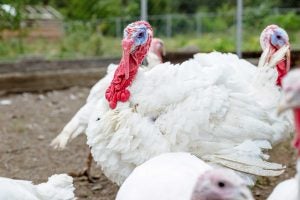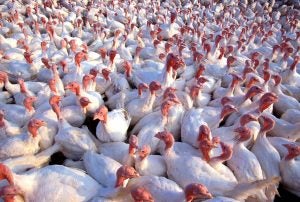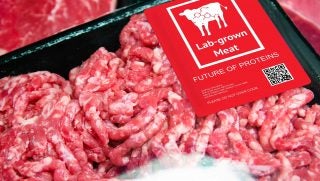The turkey industry has a history of price-fixing, for which it has been sued in recent years, and is heavily consolidated like the broiler chicken industry.
Eddie Todd has raised turkeys for a major processing company for two decades. He’s still confused about how the company calculates his pay.
The company provides the birds, and Todd, the president of the Arkansas Farmers Union, raises them. Sometimes, sick turkey chicks have been delivered to him, he said, which affects his ability to make a living because of the tournament system.
“You never know exactly what you’re going to get,” he said. “I [have] had to compete against some healthy birds, and my check was near nothing.”
In this “tournament system,” neighboring farms are pitted against each other, and growers have little information about how their payments are calculated. The federal government recently vowed reform but the changes will apply only to the chicken industry. Turkey growers such as Todd will continue to deal with the same pitfalls.
“It’s devastating,” Todd said. The reforms were “a big piece of the puzzle to make things more fair for the family farmers.”

The U.S. Department of Agriculture’s final ruling states that the turkey industry was left out because of differences between the animals’ biology, the amount of time it takes to grow a flock of turkeys compared to a broiler chicken flock, and a lack of uniformity in all turkey production contracts, as some turkey grower compensation is based on square-footage of a barn versus a tournament system.
“Much of the disclosed information would not be applicable or of significant value to turkey growers,” the ruling states.
“Just because turkeys and chickens are both birds does not mean a regulatory scheme can be 100 percent identical between the two species any more than regulations can be 100 percent identical between cows and pigs,” said Joel Brandenburger, president of the National Turkey Federation, a turkey industry advocacy group, in an emailed statement.
An analysis of USDA data by Investigate Midwest shows that nearly every chicken raised in the country is raised under contract and has been since the early 2000s. The total number of turkeys raised under contract increased 5 percent in the same time frame. And as of 2017, 70 percent of all turkey raised in the country now are raised under contract.
In the tournament system, large poultry companies like Tyson, Butterball, Jennie-O and Cargill rank growers’ performance against each other whenever they collect a flock of birds. Contract growers own the land, barns and machinery to raise birds to plump, harvestable sizes. They take on the investment in property and capital to raise livestock they do not own.
While the U.S. consumes much more chicken than turkey, both industries share a history of price-fixing and consolidation. The USDA alleges these practices have increased prices for consumers and suppressed payments for growers.
According to a 2023 antitrust lawsuit filed by the U.S. Department of Justice, poultry companies engaged in tournament systems “do not adequately disclose the risk inherent in their tournament systems to growers, and growers cannot reasonably evaluate the range of potential financial outcomes, manage their risks, or compare competing poultry processors.”
The USDA announced the creation of a new rule in 2022 to increase transparency in poultry grower contracts. In November 2023, the agency unveiled the rule’s final language, and one detail shocked Todd and other farmers like him — the agency had removed turkey contract growers from its final ruling.
Ahead of the decision, the turkey industry urged the agency to leave turkey farmers out of the major rules changes, arguing they would be “extremely difficult or impossible for turkey companies to implement.”
Todd said it’s evident that chickens and turkeys are different animals, but the contracts they operate under are “so similar.” To him, the end results of turkey and chicken farming have been the same. Todd said he’s seen big swings in pay from flock to flock, and 23 years into turkey farming, he is still in debt for his barns and equipment.
Investigate Midwest spoke with two other contract growers raising turkeys for major poultry companies. Both agreed that there is little difference between chicken and turkey contracts. The growers requested anonymity over concerns of company retaliation. Todd asked that the name of the company he grows for not be published because of similar concerns.
In North Carolina, the third-largest turkey export state in the U.S., another contract grower said the tournament system isn’t as transparent as it should be.
The North Carolina grower grew chickens for eight years and then switched to turkeys, which they currently raise. The grower said pay for both turkeys and chickens varies from check to check and they have seen swings as much as $25,000 for either flock, with little disclosure or information behind the decision.
Because of this swing in payments, the grower said they have worked in construction to make up for shortfalls in pay ever since they started raising birds. After nearly two decades of contract growing, the grower said they are more than $100,000 in debt and have had to sell off land — originally purchased to raise poultry — to make ends meet.

When asked for a response to the industry and USDA claims that the turkey contracts can’t be regulated the same way as broiler chicken contracts, the North Carolina grower turned the question around: “Why are we also on a tournament system then?”
Claire Kelloway, a researcher focused on food and agriculture with the anti-monopoly nonprofit Open Markets Institute, said minor technical differences might exist between the bird operations. Still, the base issue of the new USDA ruling is the same, no matter the bird: Farmers are going into contracts without knowing all the details, they have limited choices of which companies to grow for, and their pay, birds, feed and other inputs change from flock to flock.
“It’s hard to look at this and not see turkey farmers as being left behind,” Kelloway said.
A billion dollar industry
About 32,000 farms sell chickens in the U.S., and the USDA’s new rule will have widespread effects. But not including turkeys leaves some 11,000 farms that will not be subject to the new reforms.
The U.S. is the world’s largest producer of turkeys, a $14 billion industry in 2022, according to the USDA. The agency’s most recent agricultural census shows a 15% increase in turkey farms from 2012 to 2017. In that same time frame, the number of farms in the country that raise chicken to eat, known as broilers, stayed roughly the same.
Even so, broilers sold in the country outrank turkeys 46 to 1. The broiler industry is estimated to be worth $50 billion as of 2022.
Four companies control most of the country’s chicken supply: Tyson Foods, Pilgrim’s Pride (owned by multinational meatpacking company JBS), Perdue Farms, and Sanderson Farms.
The turkey industry is even more consolidated. Just three companies control most of the nation’s supply: Jennie-O Turkey Store, owned by Hormel Foods; Butterball, of which multinational agribusiness company Seaboard Corporation owns a majority stake; and Cargill, another agribusiness conglomerate that sells turkey under brand names Shady Brook Farms and Honeysuckle White.
Butterball and Jennie-O Turkey declined to comment for this story. Cargill did not respond to repeated requests for comment.
Turkey doesn’t make the cut
In the rulemaking process, the proposal received hundreds of comments from the public, industry groups and agriculture reform advocates. The National Turkey Federation represented major players in the turkey industry during the public comment process. The group’s leadership ranks include high-ranking officials from major turkey and poultry companies Cargill, Jennie-O Turkey, Butterball and Tyson.
The federation is a Washington, D.C.-based nonprofit trade association that serves as the “national advocate for America’s turkey industry.” The nonprofit is known for its yearly release of a presidential turkey to the White House ahead of a Thanksgiving pardon, a tradition dating back to 1947 and the Truman administration.
The trade association disagreed with the USDA’s proposed rulings that would influence how turkey contracts between growers and companies are written. The group also disagreed with the USDA because the agency based the proposal on research and findings primarily from the chicken industry.
“The National Turkey Federation pointed out numerous provisions in the proposal that would be difficult to adapt to the turkey industry,” Katie Krause, a National Turkey Federation spokesperson, said in an email. “The USDA ultimately determined that differences between the turkey and chicken industries made it too difficult to write a one-size-fits-all rule.”

During the public comment period, chicken industry giant Tyson Foods vouched for the federation’s stance to remove turkeys from the final ruling.
“The rules being proposed are superfluous to existing regulatory requirements and not needed,” Tyson wrote in its Aug. 23, 2022, public comment. “Tyson supports the comments provided by the National Chicken Council, National Turkey Federation, and the North American Meat Institute, and supports the recommendation that the Proposed Rule be rescinded.”
When the final rule was released in late 2023, the agency had removed turkey and all other non-broiler chicken poultry (such as egg-producing chickens, ducks or geese) from the official rule language in this update. The final rule is effective starting in February.
In the announcement, the agency wrote that comments from the turkey industry weighed in the final decision. “A commenter representing the turkey industry noted the proposed rule was largely based on research into the broiler industry,” the agency wrote. “The commenter asserted it would be extremely difficult for turkey companies to implement the rule due to differences between turkey and chicken production.”
Birds of a feather
This most recent rules change by the USDA is part of a larger initiative in the agency to address consolidation in the meat industry. Wholesale food providers, federal and state governments have sued the poultry industry in recent years, alleging that major companies fixed prices to rake in record profits, suppress wages for meatpacking plant workers and contract growing farmers.
The USDA began investigating a rules change in how poultry contracts operate after major poultry companies were involved in a scheme to fix prices, violating the agency’s Packers and Stockyards Act.
In a 2022 lawsuit, the DOJ sued chicken companies Sanderson Farms and Wayne Farms, data analytics company Webber, Meng, Sahl and Company, and meat company Cargill for engaging in antitrust practices. The complaint alleged that the companies were sharing confidential information in order to artificially inflate prices, while keeping wages for workers and contract growers low.
Food wholesalers and state and federal governments have also sued major turkey companies in recent years. The allegations brought forth by the lawsuits range from price-fixing to unfair contract conditions and suppressed wages for contract growers.

A Pennsylvania food distributor and New York grocery store filed a lawsuit in 2019, alleging that major turkey companies Butterball, Cargill, Jennie-O Turkey and Farbest Foods of Indiana conspired to fix prices by sharing confidential information about sales prices, production volume and wages paid to contract farmers.
The turkey companies used a data analysis service known as Agri Stats to share what would otherwise be confidential, non-public information.
The DOJ sued Agri Stats in 2023, alleging that the company was “managing anticompetitive information exchanges among broiler chicken, pork and turkey processors.” The lawsuit is ongoing.
Four states joined the lawsuit against Agri Stats a few months after the DOJ’s initial filing. Attorneys general from Minnesota, North Carolina, Tennessee and California allege that turkey companies could easily connect the dots on what information was tied to an individual company and “deanonymize” the reports.
By doing so, Butterball and Cargill could see prices from each other and other turkey companies and raise their prices, the complaint alleges.
The lawsuit also alleges turkey companies increased profit margins by more than 300% between 2013 and 2016 using Agri Stats data. The turkey cost rose in a way that “cannot be explained by underlying costs of production,” with companies reaching historic profits during the period, according to the lawsuit.
An Arkansas contract grower for Butterball, who asked not to be named over concerns of company retaliation, said there is little trust between growers and companies because of the industry’s track record. The grower said farmers are at the mercy of whatever a company brings them, be it sick birds or unexpectedly low pay. The grower called the new poultry transparency ruling “discouraging.”
“To exclude turkeys when they include chickens is ridiculous,” the grower said. “Yes, the contracts are a little different, but they work the same way.”
This story was distributed by the Mississippi River Basin Ag & Water Desk, an independent reporting network based at the University of Missouri. Newsrooms can sign up to run stories like this one for free.


